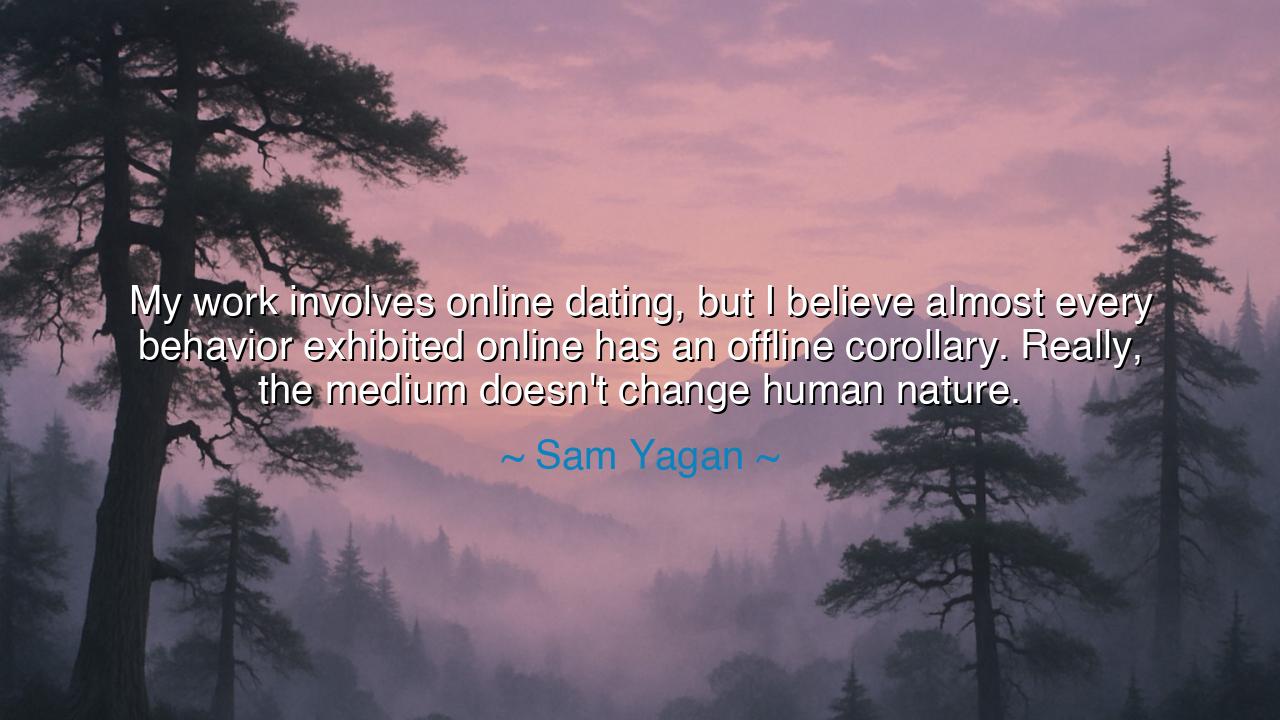
My work involves online dating, but I believe almost every
My work involves online dating, but I believe almost every behavior exhibited online has an offline corollary. Really, the medium doesn't change human nature.






In the words of Sam Yagan, one of the architects of modern digital connection, there shines a wisdom that transcends technology itself: “My work involves online dating, but I believe almost every behavior exhibited online has an offline corollary. Really, the medium doesn’t change human nature.” In these few sentences, Yagan draws back the veil of innovation to reveal an eternal truth — that while the tools of expression may evolve, the heart of humanity remains constant. He reminds us that the Internet, for all its novelty, is but a mirror — reflecting the same desires, virtues, and failings that have guided mankind since the dawn of time.
At first, Yagan speaks as a builder of algorithms, a man immersed in the machinery of modern romance. Yet his words are not about technology, but about essence — the unchanging spirit of human nature. From the written letter to the glowing screen, from whispered vows to typed confessions, the yearning to connect remains the same. Whether one stands beneath a starlit sky or before a digital profile, the impulse that drives the search for companionship is identical — the need to be seen, known, and loved. Thus, Yagan declares that technology is not transformation, but translation. It changes the language, not the longing.
The origin of this insight lies in the world Yagan helped create — the realm of online dating, where millions seek intimacy through code and pixels. As the co-founder of OkCupid and a pioneer of digital matchmaking, he has witnessed firsthand how ancient patterns of courtship reappear in new guises: the bravado of the suitor, the hesitation of the heart, the dance of hope and vulnerability. He saw that even amid algorithms and data, love still resists automation. Behind every profile and message beats the same fragile, timeless heart — uncertain, searching, alive. The lesson is clear: technology may accelerate communication, but it cannot manufacture connection.
History, too, echoes this truth. When Socrates lamented that the invention of writing would weaken memory, he misunderstood its nature. Writing did not change thought — it preserved it. The scroll and the screen are but vessels; the soul of communication endures. The same holds for every innovation since: the printing press, the telegraph, the telephone, and now the Internet. Each has altered the speed and scope of human interaction, yet none have altered the moral and emotional structure of the human being. Jealousy, affection, trust, deceit, generosity — all move through new mediums, but they remain the same ancient forces.
Yagan’s words carry a subtle warning as well: that we must not confuse medium with meaning. In our age of endless connectivity, it is easy to believe that digital life has birthed new forms of humanity — that online behavior is somehow detached from the ethics and emotions of the physical world. But the wise know better. Cruelty typed on a screen wounds no less than cruelty spoken aloud; kindness sent through text warms no less than kindness shown in person. The soul does not vanish in cyberspace — it travels with us, shaping every message, every choice, every act. Thus, the moral responsibility that governed life in the marketplace or the temple still governs us online.
The lesson of Yagan’s reflection is therefore both ancient and urgent. Master your tools, but do not let them master you. Remember that technology is the servant of the heart, not its substitute. When you act in the digital world — when you speak, share, or reach out — remember that you carry your humanity into that realm. Do not hide behind screens to escape your conscience; instead, let your actions, whether online or off, reflect the same integrity, patience, and empathy that define a noble life.
So let these words be your guide in an age of transformation: The medium does not change human nature. The scroll may glow, the message may fly at the speed of light, but the virtues that sustain life — honesty, compassion, courage, and love — remain the same as they were in the time of the ancients. Technology can extend your voice, but it cannot give it meaning. Only you can do that. Therefore, wherever you go — in the village, in the city, or in the boundless expanse of the digital world — walk not as a creature of devices, but as a bearer of the unchanging human spirit.






AAdministratorAdministrator
Welcome, honored guests. Please leave a comment, we will respond soon